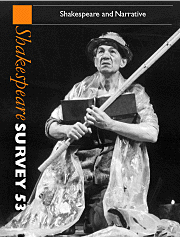Book contents
- Frontmatter
- Shakespeare’s Narremes
- Stepping Out of Narrative Line: A Bit of Word, and Horse, Play in Venus and Adonis
- A ‘consummation devoutly to be wished’: The Erotics of Narration in Venus and Adonis
- Echoes Inhabit a Garden: The Narratives of Romeo and Juliet
- A Midsummer Night’s Dream: Comedy as Apotrope of Myth
- Plutarch, Insurrection, and Dearth in Coriolanus
- Shakespeare, Crossing the Rubicon
- Vernacular Criticism and the Scenes Shakespeare Never Wrote
- The Shadow of Lear’s ‘Houseless’ in Dickens
- Shakespearian Margins in George Eliot’s ‘working-day world’
- In Her Father’s Library: Margaret Fuller and the Making of the American Miranda
- The Magician in Love
- Narrative Approaches to Shakespeare: Active Storytelling in Schools
- Monsters, Magicians, Movies: The Tempest and the Final Frontier
- Shakespeare’s Self-Repetitions and King John
- Inside Othello
- The View of London from the North and the Playhouses in Holywell
- Measured Endings: How Productions from 1720 to 1929 Close Shakespeare’s Open Silences in Measure for Measure
- Shakespearian Utopias
- Shakespeare Performances in England, 1999
- Professional Shakespeare Productions in the British Isles January–December 1998
- The Year's Contributions to Shakespearian Study 1 Critical Studies
- 2 Shakespeare’s Life, Times, and Stage
- 3 Editions and Textual Studies
- Books Received
- Index
2 - Shakespeare’s Life, Times, and Stage
Published online by Cambridge University Press: 28 March 2007
- Frontmatter
- Shakespeare’s Narremes
- Stepping Out of Narrative Line: A Bit of Word, and Horse, Play in Venus and Adonis
- A ‘consummation devoutly to be wished’: The Erotics of Narration in Venus and Adonis
- Echoes Inhabit a Garden: The Narratives of Romeo and Juliet
- A Midsummer Night’s Dream: Comedy as Apotrope of Myth
- Plutarch, Insurrection, and Dearth in Coriolanus
- Shakespeare, Crossing the Rubicon
- Vernacular Criticism and the Scenes Shakespeare Never Wrote
- The Shadow of Lear’s ‘Houseless’ in Dickens
- Shakespearian Margins in George Eliot’s ‘working-day world’
- In Her Father’s Library: Margaret Fuller and the Making of the American Miranda
- The Magician in Love
- Narrative Approaches to Shakespeare: Active Storytelling in Schools
- Monsters, Magicians, Movies: The Tempest and the Final Frontier
- Shakespeare’s Self-Repetitions and King John
- Inside Othello
- The View of London from the North and the Playhouses in Holywell
- Measured Endings: How Productions from 1720 to 1929 Close Shakespeare’s Open Silences in Measure for Measure
- Shakespearian Utopias
- Shakespeare Performances in England, 1999
- Professional Shakespeare Productions in the British Isles January–December 1998
- The Year's Contributions to Shakespearian Study 1 Critical Studies
- 2 Shakespeare’s Life, Times, and Stage
- 3 Editions and Textual Studies
- Books Received
- Index
Summary
It is ironic that the Bard voted ‘Man of the Millennium’ in Britain has simultaneously been increasingly associated with a subversive Catholic minority in early modern England. This year has seen a growing tide of interest in Shakespeare’s connection with the culture of the Counter-Reformation. Biographical studies by Honan and Holden note that the theory that Shakespeare spent time in Lancashire in the service of the Catholic de Hoghton family is the most likely explanation for the so-called ‘lost years’. Manchester University Press has reprinted Honigmann’s Shakespeare: The ‘Lost Years’, the pioneering book that revived the theory in the mid-1980s. The new edition is very welcome, as this remains the best book-length collection and analysis of the evidence; it was frequently cited at Lancastrian Shakespeare: Region, Religion, Patronage and Performance, an international conference held at Hoghton Tower and Lancaster University (21–4 July 1999). Honigmann’s new edition contains a second preface, citing Richard Wilson’s recent research on the Lancashire theory. In ‘Shakespeare and the Jesuits: New Connections Supporting the Theory of the lost Catholic years in Lancashire’, Wilson draws striking links between John Cottom, schoolmaster at Stratford Grammar School, the de Hoghtons, and the Sodality of young Jesuit priests who were recruited by Edmund Campion.
- Type
- Chapter
- Information
- Shakespeare SurveyAn Annual Survey of Shakespeare Studies and Production, pp. 317 - 331Publisher: Cambridge University PressPrint publication year: 2000

